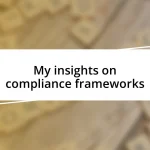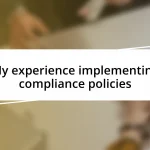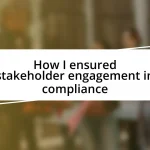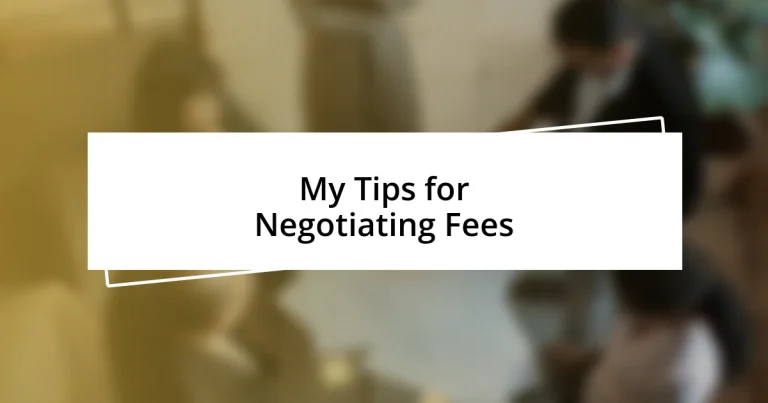Key takeaways:
- Preparation and adaptability are crucial for successful negotiations, including self-reflection on worth and setting clear boundaries.
- Present your case effectively using concrete examples, data, and storytelling to showcase value and build rapport.
- Handle objections with empathy and clarity, transforming resistance into collaboration, and finalize agreements by addressing practicalities and ensuring mutual understanding.
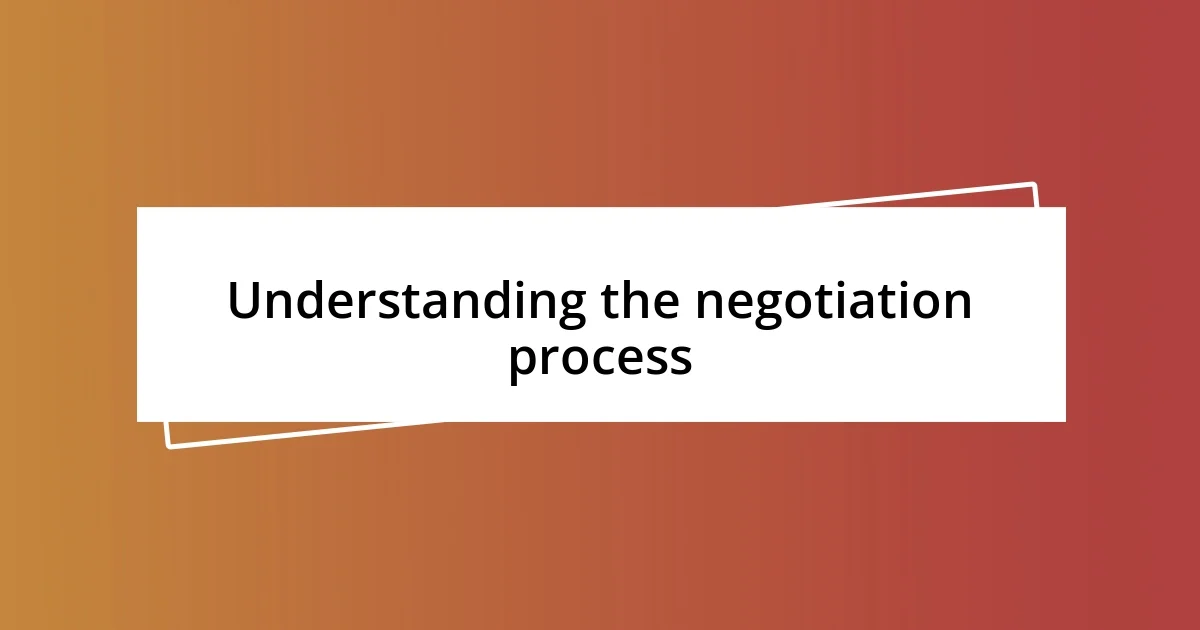
Understanding the negotiation process
Understanding the negotiation process is like mastering a dance; it’s not just about the words but also about the rhythm of the interaction. I remember my first negotiation where I felt like I was stepping on my partner’s toes. I quickly learned that listening is just as critical as speaking. Have you ever noticed how much you can glean from someone’s body language?
The key to a successful negotiation lies in preparation and adaptability. I once approached a fee discussion with rigid expectations, only to realize that being flexible led to a better outcome. Isn’t it fascinating how the willingness to explore alternatives can open up new possibilities?
Also, establishing rapport is crucial. There’s an undeniable connection that forms when both sides feel heard and respected. I’ve walked away from negotiations where I focused solely on the figures, and it felt empty. How have your past interactions shaped your approach to negotiations? It’s a journey of learning, where each conversation builds your confidence for the next round.
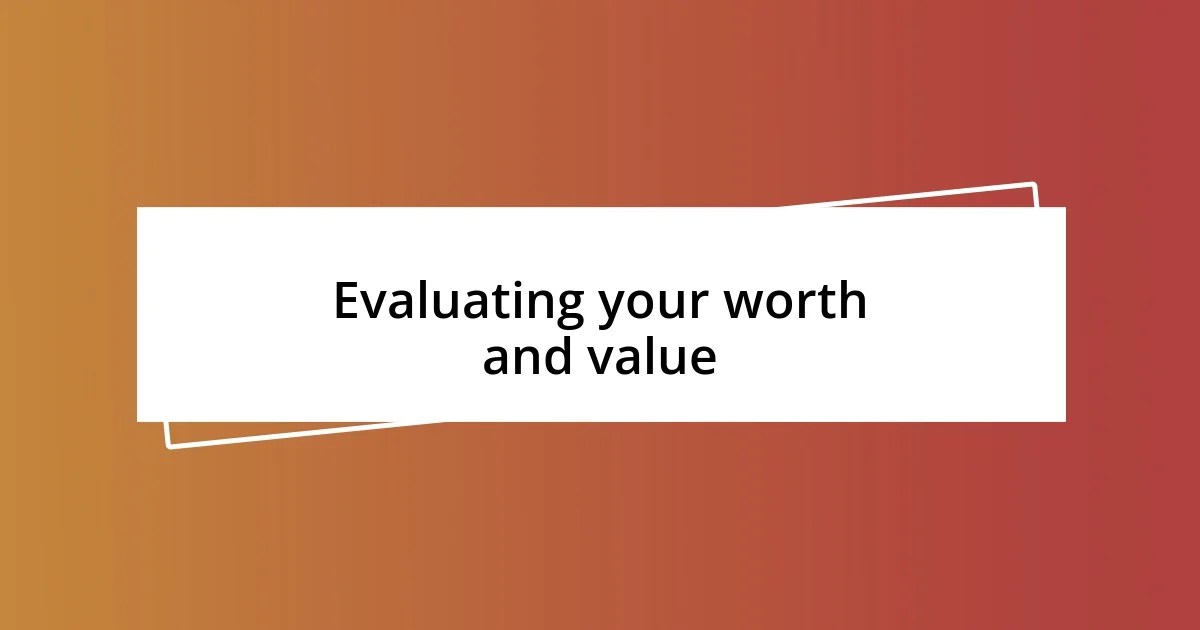
Evaluating your worth and value
Evaluating your worth and value begins with self-reflection. Think about your skills, experience, and what you bring to the table. When I first considered my value, I jotted down a list of my achievements and qualifications. Seeing those accomplishments laid out made a tangible difference in how I viewed myself. Have you ever taken a moment to really appreciate your unique strengths?
The next step is to research industry standards. I remember gathering data on what others in my field were charging and realizing I was undervaluing my services. This wasn’t just about numbers; it was about understanding my position in the market and equating it to my personal worth. It can be eye-opening to see how your skills compare, and it might just inspire you to aim higher.
Lastly, consider the emotional aspect of value. I’ve felt the anxiety that comes with negotiating fees, almost like being put on the spot. But acknowledging that my contributions are significant helps ease that tension. It’s essential to remember that your worth isn’t solely defined by monetary figures, but also by the impact you create in your field and the relationships you build. So, what emotions tie back to how you perceive your value?
| Evaluating Your Worth | Action Steps |
|---|---|
| Self-Reflection | List accomplishments and skills |
| Market Research | Compare fees in your industry |
| Emotional Insight | Acknowledge the significance of your contributions |
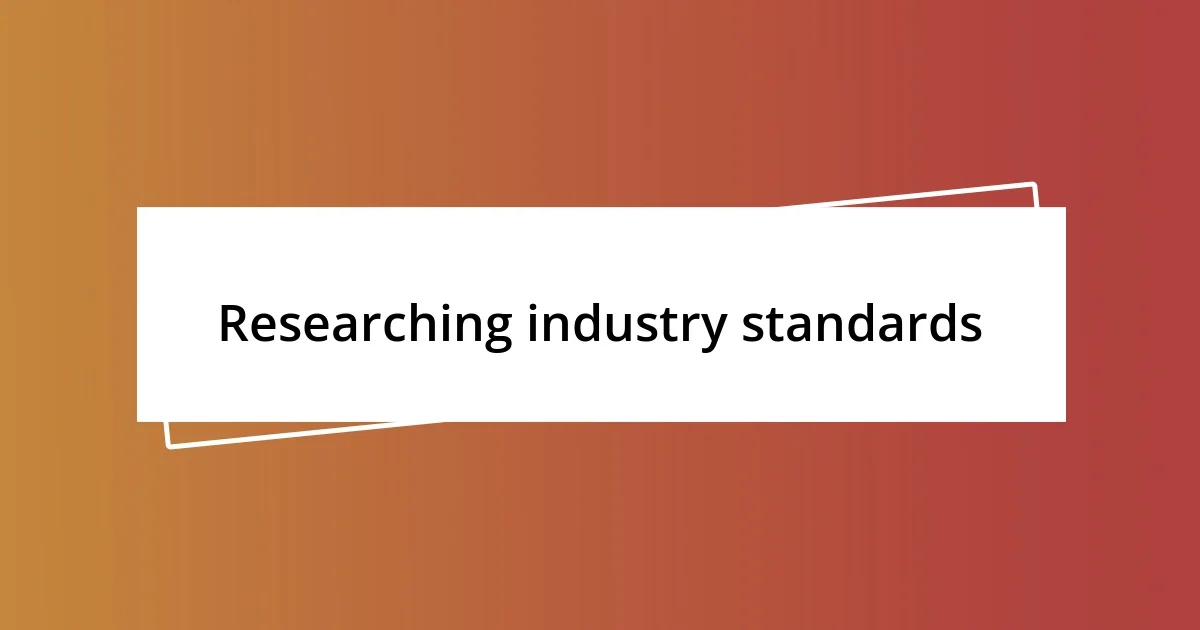
Researching industry standards
Researching industry standards is not only a practical step but also a pivotal one that can greatly influence your negotiation outcomes. I remember diving deep into various forums and websites dedicated to my industry and discovering a wealth of information on what peers were charging. That moment was enlightening; it wasn’t just numbers—it revealed trends, expectations, and how far off I was from the standard rates. Seeing this data foregrounded the reality of my worth, making me feel more empowered and validated.
Consider these key points while researching industry standards:
- Market Research: Identify reliable sources such as industry reports or salary benchmarks relevant to your field.
- Networking: Engage with peers or mentors who can provide insights based on their experiences.
- Competitive Analysis: Look at competitors or similar roles to see where you stand in relation to their pricing.
- Online Communities: Join forums or social media groups to gather real-time discussions on fee structures.
- Freelance Platforms: Browse profiles of professionals in your niche to see common fee ranges.
Bringing these insights to your negotiations can significantly boost your confidence and set realistic fee expectations. The more you know, the better you can advocate for yourself.
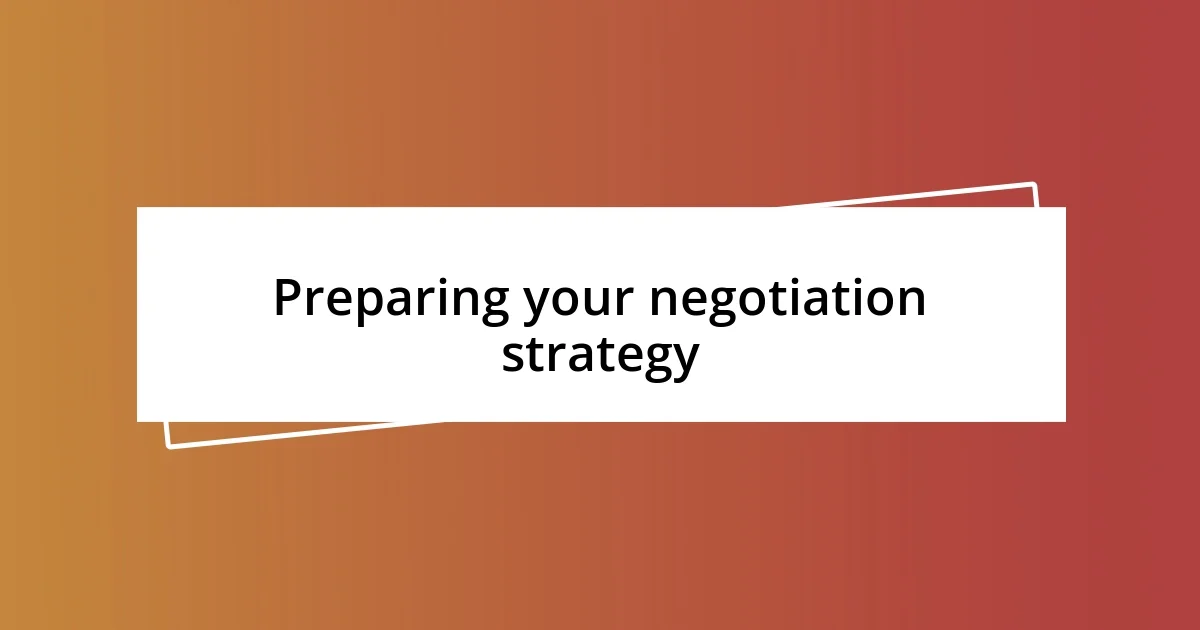
Preparing your negotiation strategy
Preparing your negotiation strategy involves a thoughtful approach to ensure you present yourself confidently. I’ll never forget when I was gearing up to negotiate my fees for the first time. I sat down with a pen and paper, mapping out my strategy, and it benefited me tremendously. Have you ever thought about laying out your main points before a crucial conversation? It gives you a crystal-clear framework to rely on during the actual negotiation.
As I delved deeper into my strategy, I approached it almost like preparing for a performance. I envisioned the questions I might face and the responses I wanted to give. For instance, I practiced articulating my value with clarity and conviction, which helped alleviate some of the pressure I felt. How often do we go into these discussions without a clear game plan, leaving ourselves vulnerable to unexpected challenges?
Another essential part of preparation is setting your boundaries. I distinctly recall a moment when I almost agreed to a lower fee because I was caught off guard. Realizing my lower limit allowed me to confidently push back and advocate for my worth. Establishing these boundaries ahead of time helps maintain focus and ensures that you don’t settle for less than what you deserve. Have you ever thought about what your deal-breakers are in negotiations? Knowing them in advance can make all the difference.

Presenting your case effectively
When it comes to effectively presenting your case, clarity is key. I remember a time when I faced a particularly challenging negotiation; I felt my emotions rising as I tried to articulate my value. It became clear to me that simply stating what I wanted wasn’t enough. Instead, I learned to weave in specific examples of my past work that showcased my skills and success. By doing this, I not only explained my worth but also painted a vivid picture for the other party. Have you ever tried to communicate your value without concrete examples? It can feel like trying to build a bridge without any support—wobbly and uncertain.
In presenting your case, using data to support your argument can be a game-changer. I once highlighted metrics from previous projects, demonstrating how my contributions led to increased revenue for my clients. The look of realization on the other side was palpable. It reinforced my belief in the power of numbers to back my claims. Have you ever noticed how a well-placed statistic can shift the energy of a conversation? It not only adds credibility but also shifts the focus from subjective opinions to tangible results.
Lastly, don’t underestimate the role of storytelling in negotiations. There was an instance when I shared a personal anecdote from a challenging project that showcased my problem-solving skills. By connecting emotionally, I drew the other party into my narrative, making them more invested in the outcome. Can you remember a time when a relatable story influenced your perspective? This technique can create a bond and foster understanding, making your case more compelling and memorable.
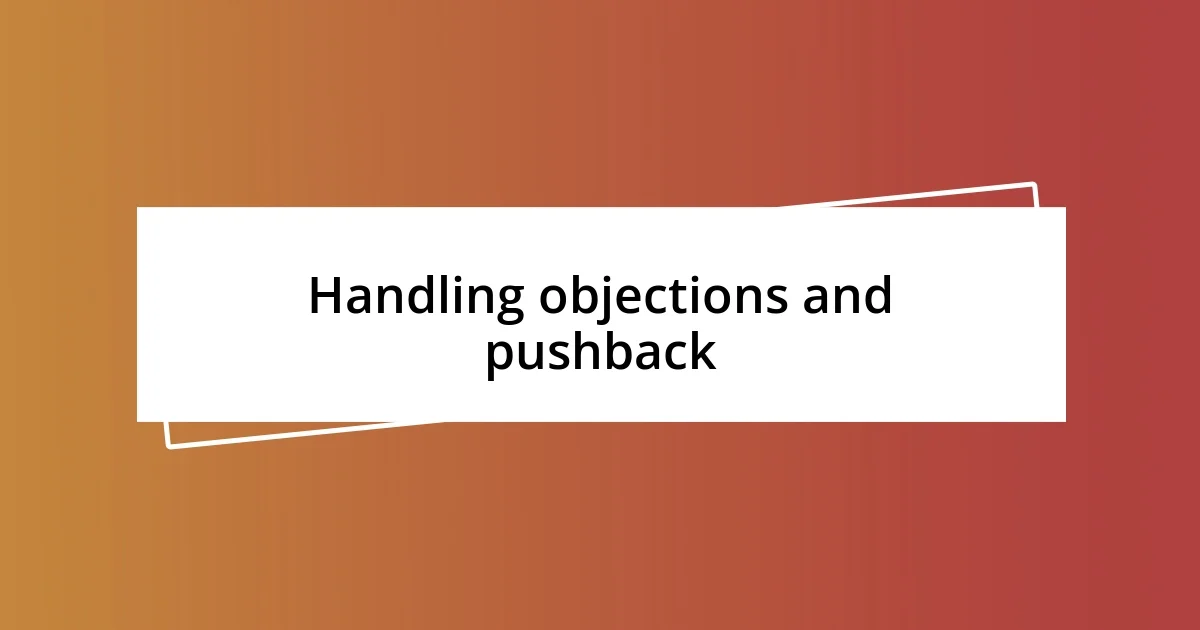
Handling objections and pushback
Facing objections and pushback during negotiations can feel daunting. I remember my first real negotiation where the client hesitated, citing budget constraints. Instead of retreating, I took a deep breath and asked clarifying questions to understand their concerns better. Have you ever paused to truly listen when someone expresses doubt? This approach helps navigate pushback and turns it into productive dialogue.
It’s crucial to anticipate objections and prepare for them. I once faced a situation where a potential client questioned my rate. Instead of getting defensive, I calmly outlined how my expertise would save them time and money in the long run. Why not think of objections as opportunities to reinforce your value? Engaging the other party by reframing their concerns can showcase your confidence and adaptability.
Emotional intelligence plays a significant role in handling pushback, too. There was a time when a client expressed frustration over additional costs. I empathized with their position, acknowledging their strain while gently reinforcing the quality and benefits of my services. Reflecting on their feelings can transform resistance into collaboration. Have you considered how empathy could reshape the negotiation landscape? It’s an effective tool that fosters trust and leads to mutually beneficial outcomes.
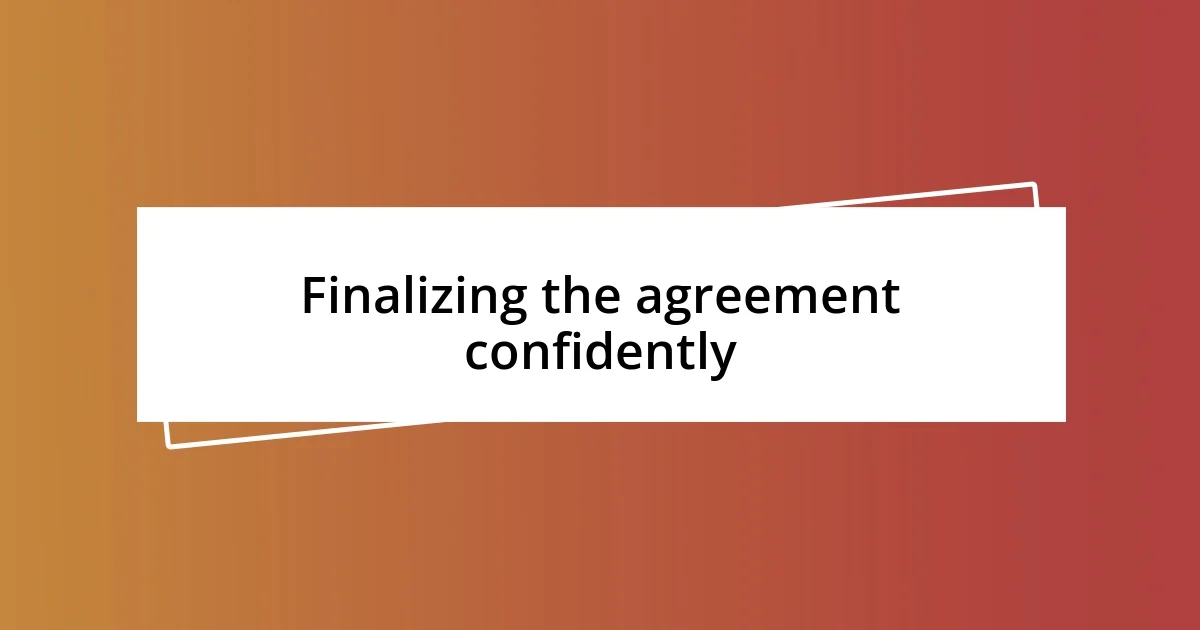
Finalizing the agreement confidently
Finalizing an agreement confidently is all about embracing clarity and assurance. I vividly recall a negotiation where everything seemed to hinge on that final moment. As we approached sealing the deal, I made sure to summarize our discussions clearly, ensuring we were on the same page. Have you ever felt that moment of uncertainty just before the final handshake? Taking a moment to recap what’s been agreed upon not only reaffirms your position but also shows that you have a clear vision for the partnership ahead.
I’ve learned the importance of setting the tone during the finalization process. In one instance, I noticed the other party growing hesitant as we neared agreement. With a genuine smile and a calm demeanor, I reiterated how our partnership would positively impact both sides, which eased their concerns. Isn’t it fascinating how a simple, positive energy can transform apprehension into enthusiasm? Confidence during this stage can help foster trust and excitement for the collaboration to come.
Lastly, don’t shy away from discussing the practicalities in this phase. Once, I was finalizing a contract, and I noticed some fine print that could lead to misunderstandings later. Rather than glossing over it, I addressed it upfront, which sparked a transparent dialogue. How often do we overlook those details in the rush to finalize? By being proactive and ensuring all concerns were addressed, I not only secured a deal but also laid the groundwork for a strong, trust-filled relationship moving forward.


